|
< Earlier Kibitzing · PAGE 3 OF 3 ·
Later Kibitzing> |
Jun-01-12
 | | AylerKupp: <<harrylime:> Your term 'outplayed' is silly tho...> Why is the term "outplayed" silly? Everyone, even the best of them, get outplayed once in a while. And Fischer in 1959 was nowhere near the best of them with an international winning percentage of 59% (W=31, L=19, D=19) compared to his international winning percentage of 81% in 1967, 87% in 1968, 80% in 1970, and 88% in 1971. Source: http://www.bobby-fischer.net/Tourna... How does one lose a chess game anyway? Well, of course, one way is to be outplayed. Another way is to have a momentary lapse of judgment in an even or winning position, blunder, and lose. Yet another way is to have an even or superior position but be short of time compared with one's opponent and make a mistake due to insufficient time for calculation. And I'm sure that there are others that I haven't thought of. Looking only at material, after 17...axb5 Fischer was up the equivalent of 3 pawns. By move 21...Rxh8 Fischer was down the equivalent of 2 pawns, a 5–pawn equivalent swing as a result of overlooking or underestimating the knight sac 17.Ndxb5. By move 36...Rf8 he was down the equivalent of 3 pawns. By move 38...Be6 he was down the equivalent of 4 pawns. When he resigned he was down the equivalent of 3 pawns. At no time after 17.Ndxb5 did Fischer have a superior position that he threw away by a momentary lapse of judgment, and Gligoric had the initiative throughout the rest of the game. True, Fischer might have lost on time but if you have any belief in chess engines Houdini 1.5a evaluated the final position at [+5.11], d=25, clearly a lost position for Black. And with 3 connected passed q-side pawns ready to advance I tend to agree with Houdini , for whatever that's worth. So all the time in the world in Fischer's clock would likely not have helped him. So as far as I'm concerned he was clearly outplayed by Gligoric this time. |
|
| Jun-01-12 | | Petrosianic: <Why is the term "outplayed" silly? Everyone, even the best of them, get outplayed once in a while.> The best of them, maybe. Demigods no.
<And Fischer in 1959 was nowhere near the best of them> Bite your tongue! Of course he was! He was just going easy so that others could have a chance at the title too. How boring would it have been if Fischer had won the world title at age 6 and held it until he was 64, which he could very easily have done if he'd wanted to. If you don't believe Harry or me, ask Riverbeast or Rookfile. They'll tell you the same thing. Could all four be wrong? |
|
| Jun-01-12 | | RookFile: Actually, I said that Fischer wasn't quite ready until after 1962, but don't let the facts get in your way. |
|
| Jun-01-12 | | kasparvez: I can't understand what's this big fuss about a simple word i used to describe this game. After f5, the subsequent play from both sides clearly shows that Fischer was outplayed. Period. Ironically, Fischer was a much much more objective examiner of his play than these half-wit Tom, Dick and Harrys. I remember, in the famous four queens game with Petrosian, after move 20 he himself confessed "I already knew i'd been outplayed" [MSMG]. But then of course, all this is pure blasphemy. As Petrosianic puts it, the best of them may get occasionally outplayed, Demigods, no. |
|
| Jun-01-12 | | Petrosianic: <I can't understand what's this big fuss about a simple word i used to describe this game.> Well, suppose you said Zeus had an off day. Or that Superman was a little off on that whole invulnerability to bullets thing on Tuesday. The whole thing that sets beings like that apart from you is that they don't HAVE off days. If they seem to, it's all part of a cunning scheme to improve human society, or catch Lex Luthor, or something. |
|
Jun-01-12
 | | AylerKupp: <kasparvez> There are no simple words as far as Fischer is concerned. As you can see, there seems to be much emotion involved for reasons that, frankly, I don't understand. And I expect <Petrosianic> to get blasted because he referred to Fischer as "only" a demigod and not a full god. |
|
| Jun-01-12 | | Petrosianic: A foolish mistake on my part. Especially if it should some day be proved that Regina was a virgin when Fischer was born. (I think Rookfile is working on that angle now). |
|
| Jun-01-12 | | RookFile: Actually, I'm working on a device that will prevent you from putting words in my mouth. |
|
| Jun-02-12 | | asiduodiego: It's the same thing with Bxh2 in the first game in the World Championship: It wasn't a mistake or a blunder, god forbid: it was an "intricate psychological ploy" by Fischer, by throwing the game on purpose. Yeah, and he walked on water and died for our sins.
But this one is a nice game, I must say. |
|
| Jun-02-12 | | RookFile: I hate to interrupt this with factual information, but Gligoric said after the game that 22...... Nc5 brings about an equal game. |
|
Jun-03-12
 | | AylerKupp: But if Gligoric was right and Fischer was indeed able to equalize by 22...Nc5 but played an inferior move instead and eventually lost, doesn't that mean that he was outplayed? Or is there a definition of "outplayed" that I'm not familiar with that applies in this case? I still don't understand why it's so difficult for some people to admit that Fischer or whoever their favorite player is could get outplayed on occasion. What's the big deal? Like I said earlier, it happens to the best of them. Even during his peak in the years 1967 – 1971 Fischer lost 7 games in international competition and I suspect that he was outplayed in at least some of them. |
|
| Jun-03-12 | | RookFile: Gligoric outplayed Fischer in this game. |
|
Jun-03-12
 | | AylerKupp: <RookFile> This may be of some interest. According to Rybka 4.1 at medium search depth (d=21), 22...Nc5 was indeed Black's best move but it didn't quite equalize, the resulting position after 22...Nc5 23.b4 Na4 24.Qb3 Nb6 25.a4 Nc8 26.Re2 Rd8 27.Rd3 Nd6 28.Bg2 Qc7 29.Bf3 Bf6 30.c4 Ba6 31.b5 Bb7 32.Qb4 Qxc4 33.Qxc4 Nxc4 34.Rxd8+ Bxd8 35.Kc2 Nd6 36.Kd3 Bf6 37.Bg2 Kc7 being evaluated at [+1.15].
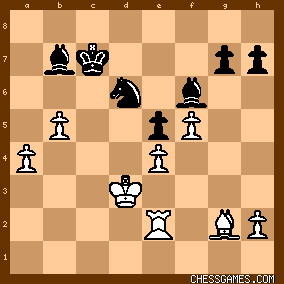
click for larger viewWhite certainly has some advantage, R+2P vs. B+N but its bishop is somewhat bad and tied to the defense of the Pe4. But after (presumably) 38.Rc2+ Kb6 39.Kc3 (to protect the Pa4 after a possible 39...Ka5) and 40.Kb3 White's rook may be able to penetrate. But it doesn't look (to me) to be an easy ending to win. Then again, to me most endings are hard to win. Fischer's 22...Bf4 was not considered by Rybka to be one of Black's top 5 moves after 22.Rhe1 (the next 4 top moves were 22...Nf6, 22...Bh4, 22...Bc6, and 22...Rf8 respectively). Rybka evaluated the resulting position after the least good of these (22...Rf8) at [+1.55]. In contrast, Rybka evaluated the resulting position after Fischer's 22...Bf4 at [+1.72] after 23.Qb3 Bg5 (Fischer played 23...Nc5, maybe belatedly seeing the desirability of that move, but Rybka's move sure looks like a loss of 2 tempos) 24.Bf1 Rc8 25.Bc4 Rc6 26.Rxd7 (an interesting simplification by Rybka) 26...Qxd7 27.Bb5 Kc7 28.Bxc6 Bxc6 29.Qd3 Qe7 30.Rd1 g6 31.fxg6 hxg6 32.b4 Bf4 33.b5 Bb7 34.h3 g5 35.Kb2 Bc8 36.Qc4+ Kb8 37.Rd3 Bb7 38.b6

click for larger viewWhite is certainly better here than in the first line after 22...Nc5 due to his advanced b-pawn. I don't see any obvious way to stop a3-a4-a5 etc. and Black's DSB seems to be out of play, blocked by its own pawns. Who knows, maybe even I could win this endgame (but not against Fischer!). But this continuation bears no relationship to the actual game consideration so who knows what it really means. |
|
| Jun-04-12 | | RookFile: If the rook should penetrate, where would it go?
In looking at your first diagram, to me there is only 1 question: can black blockade those queenside pawns or not? That's the whole ballgame. Wouldn't dare to try to guess the answer. |
|
Jun-04-12
 | | offramp: The position at move 10 was almost replicated in Zhao Jun vs Zhou Jianchao, 2012 played the day before yesterday:
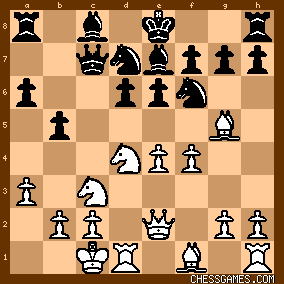
click for larger view |
|
Jun-05-12
 | | AylerKupp: <offramp> How interesting. I was amused at the delayed Nxb5 sac similar to this game. |
|
Jun-05-12
 | | AylerKupp: <RookFile> As far as the rook penetrating, that's a good question, one that I should have asked myself. It's the kind of thing one thinks about on general principles, but general principles seldom win chess games, it's the specifics that count. As far as Black being able to blockade those queenside pawns, I wouldn't dare to try to guess the answer either and, if I did, what would be the point? But I did "ask" Rybka who I consider to be the best endgame playing engine. And Rybka couldn't answer the question either. Starting from the final position in the 22...Nc5 line above after 37...Kc7, Rybka evaluated the resulting position at only [+0.36], d=31 after 38.Kc3 Be7 39.Re3 Kb6 40.Kb3 Ka5 (it's clear to even me now that with the pressure against both the Pa4 and the Pe4 that White will not be able to make any progress) 41.Rd3 Kb6 42.Rg3 Bf8 43.Re3 Ka5 44.Bh1 Be7 45.Rc3 Kb6 46.Rg3 Bf8 47.Rg4 Ka5 48.Bg2 Ne8 49.f6 Nxf6 50.Rg5 Nxe4 51.Bxe4 Bxe4 52.Rxe5 Bb7 53.Re8
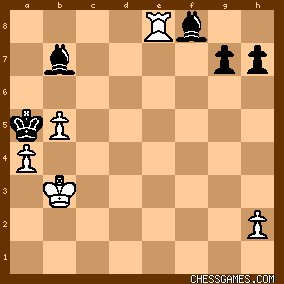
click for larger viewAnd here Black's 2 bishops should be able to blockade White's 2 passed pawns without too much difficulty. But at least we saw the possibilities of the rook "penetrating". :-) But now I'm really curious, usually a bad sign. So I'm playing a mini-tournament, 4 games, Rybka 4.1 vs. Houdini 1.5a, 40/120, starting from the position after 22...Nc5. We'll see what happens. So far I've had them play 2 blitz games, 5 mins, with one draw and one win (Houdini). Interestingly, Houdini played the White pieces much more aggressively than Rybka did; we'll see if that repeats at the longer time controls. I'll report back tomorrow. |
|
Jun-06-12
 | | AylerKupp: "Gligoric" vs. "Fischer", 2012 (part 1 of 2)
<RookFile> OK, here are the results of my engine tournament, 40 moves in 2 hours for each engine, with 20 moves/hour afterwards, with each game starting from the position if Fischer had played 22...Nc5
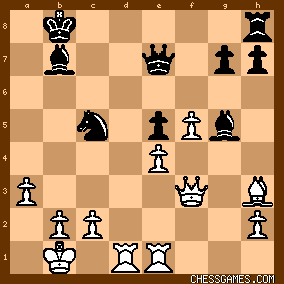
click for larger viewGame 1: Rybka 4.1 vs. Houdini 1.5a. Black resigns after 53 moves. Game 2: Houdini 1.5a vs. Rybka 4.1. Black resigns after 50 moves. Game 3: Rybka 4.1 vs. Houdini 1.5a. Black resigns after 71 moves. Game 4: Houdini 1.5a vs. Rybka 4.1. Black resigns after 51 moves. So, from a practical perspective and depending on what you and others think of the relative playing strength of Gligoric, Fischer, Rybka 4.1, and Houdini 1.5a, Gligoric was apparently wrong; 22...Nc5 does not really equalize the game. It looks like White can force the advance of the q-side pawns although not necessarily queen any of them, and that White can resolve the asymmetric material imbalances (R+6P vs. N+B+3P) into positions where the material is symmetric and it's 2 pawns up. Some interesting tactics, an apparent bit of humor by Houdini with its bishop underpromotion in the 3rd game, and an unexplainable rook sac by Rybka in the 4th game. And, for whatever it's worth, Houdini seemed to have less trouble beating Rybka than Rybka had in beating Houdini, 101 total moves for Houdini in its winning efforts vs. 124 moves for Rybka in its winning efforts. The games were played in a computer with a Intel Q7400, 4-core, 32-bit processor and 4 GB memory. Each engine was given a 1024 MB hash table and Rybka used 5-man Nalimov tablebases while Houdini used 5-man Gaviota tablebases, with Ponder=OFF. Here are the game scores following 22...Nc5 in case anyone is interested. The initial moves for each game were 1.e4 c5 2.Nf3 d6 3.d4 cxd4 4.Nxd4 Nf6 5.Nc3 a6 6.Bg5 e6 7.f4 Be7 8.Qf3 Qc7 9.O-O-O Nbd7 10.g4 b5 11.Bxf6 Nxf6 12.g5 Nd7 13.a3 Bb7 14.Bh3 O-O-O 15.f5 Bxg5+ 16.Kb1 e5 17.Ndxb5 axb5 18.Nxb5 Qc5 19.Nxd6+ Kb8 20.Nxf7 Qe7 21.Nxh8 Rxh8 22.Rhe1 Nc5 [Event "Gligoric vs.Fischer 1959, 22...Nc5"]
[Date "2012.06.05"]
[Round "1"]
[White "Rybka 4.1 w32"]
[Black "Houdini_15a_w32"]
[Result "1-0"]
... 23.b4 Nd7 24.c4 Bc6 25.c5 Nf6 26.Bg2 Rc8 27.Qb3 Qb7 28.Ka1 Nd7 29.Qe6 Qa6 30.Ka2 Rc7 31.Rd6 Qa4 32.Qb3 Bh4 33.Rb1 Qxb3+ 34.Kxb3 Nf6 35.a4 Bb7 36.Rc1 Ng4 37.Rc3 Bf2 38.Rd8+ Bc8 39.Bf3 Nh6 40.Be2 Nf7 41.Re8 Ng5 42.Ba6 Nxe4 43.Rc2 Bd4 44.Rxc8+ Rxc8 45.Bxc8 Kxc8 46.Rg2 g5 47.Kc4 h5 48.a5 Kb8 49.Re2 Nf6 50.b5 Ka7 51.b6+ Ka6 52.c6 Bxb6 53.axb6 Kxb6 (Black resigns) 1-0

click for larger view |
|
Jun-06-12
 | | AylerKupp: "Gligoric" vs. "Fischer", 2012 (part 2 of 2)
[Event "Gligoric vs.Fischer 1959, 22...Nc5"]
[Date "2012.06.05"]
[Round "2"]
[White "Houdini_15a_w32"]
[Black "Rybka 4.1 w32"]
[Result "1-0"]
... 23.b4 Na4 24.Qb3 Bc6 25.b5 Nc5 26.Qb4 Ba8 27.b6 Bf6 28.Re3 Rc8 29.Qa5 Qb7 30.Rd5 Rc6 31.Rxc5 Rxb6+ 32.Rb3 Rxb3+ 33.cxb3 Qxb3+ 34.Ka1 Qd1+ 35.Kb2 Qd4+ 36.Ka2 Bd8 37.Qb5+ Bb7 38.Rd5 Qf2+ 39.Kb3 Bc7 40.Bf1 g6 41.Bd3 gxf5 42.exf5 Qf3 43.Rxe5 Bxe5 44.Qxe5+ Kc8 45.Qd4 Qd1+ 46.Kb4 Qd2+ 47.Qc3+ Qxc3+ 48.Kxc3 Kd7 49.a4 Ke7 50.a5 Kf6 (Black resigns) 1-0
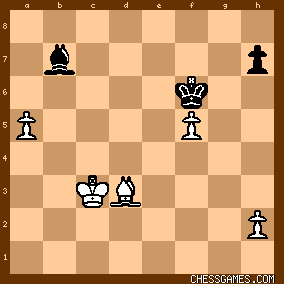
click for larger view[Event "Gligoric vs.Fischer 1959, 22...Nc5"]
[Date "2012.06.05"]
[Round "3"]
[White "Rybka 4.1 w32"]
[Black "Houdini_15a_w32"]
[Result "1-0"]
... 23.b4 Na4 24.Qb3 Nb6 25.a4 Rd8 26.a5 Nc8 27.Rxd8 Qxd8 28.Qd3 Qd6 29.Qxd6+ Nxd6 30.Rg1 Bf6 31.Bg2 Nxe4 32.Kb2 Nd6 33.Bxb7 e4+ 34.Kb3 Kxb7 35.Re1 Bg5 36.Re2 e3 37.c4 Nxf5 38.Kc3 Bf6+ 39.Kd3 Nd4 40.Rxe3 Nc6 41.a6+ Ka7 42.b5 Ne5+ 43.Ke4 Nxc4 44.Rd3 Nb6 45.Rd6 h5 46.Rc6 Bd8 47.Ke5 g5 48.Kd6 g4 49.Rc2 h4 50.Rf2 g3 51.hxg3 hxg3 52.Rf7+ Kb8 53.Rf8 g2 54.Rg8 g1=B (a bit of humor by Houdini?) 55.Rxg1 Bh4 56.Rg2 Bf6 57.Rg4 Ka7 58.Kc6 Bc3 59.Re4 Ba5 60.Re7+ Ka8 61.a7 Nc4 62.Re4 Nb6 63.Re2 Kxa7 (this is a mate in 27 for White per the 6-man Nalimov tablebases but neither engine could see that with only 5-man tablebases) 64.Ra2 Nc4 65.Kc5 Kb7 66.Kxc4 (and here Houdini should have seen that it was hopeless and resigned but of course it didn't know that his opponent also had access to 5-man tablebases, so maybe it was just being optimistic :-) ) 66...Bb6 67.Rc2 Ka7 68.Rg2 Be3 69.Rg6 Kb7 70.Re6 Bf2 71.Kb4 Bd4 (Black resigns) 1-0

click for larger view[Event "Gligoric vs.Fischer 1959, 22...Nc5"]
[Date "2012.06.05"]
[Round "4"]
[White "Houdini_15a_w32"]
[Black "Rybka 4.1 w32"]
[Result "1-0"]
... 23.b4 Na4 24.Qb3 Bc6 25.b5 Nc5 26.Qc4 Bb7 27.Qb4 Rf8 28.Qa5 Bh4 29.Re2 Bg5 30.Bg4 Bf4 31.Ree1 h5 32.Bxh5 Nxe4 33.b6 Ba8 34.Rd3 Bd2 35.Rxd2 Nxd2+ 36.Qxd2 Rxf5 37.Bg4 Rg5 38.Be2 e4 39.Rd1 Rd5 40.Qf4+ Qe5 41.Qf8+ Kb7 42.Rg1 g5 43.Rf1 Qd4 44.Rf6 Rd8 45.Qg7+ Rd7 46.Qxg5 Qd5 47.Qf4 Rg7 48.c4 Qd4 49.Rd6 Rg1+ 50.Kc2 Rc1+ (Huh? Couldn't Rybka calculate that it couldn't force a perpetual?) 51.Kxc1 Qc3+ (Black resigns) 1-0

click for larger view |
|
| Jun-07-12 | | RookFile: This is all good stuff. To summarize, it's probably accurate to say that Nc5 is black's best try - with perfect play, it doesn't quite equalize. With imperfect play, it's a ballgame again. |
|
Jun-07-12
 | | AylerKupp: Yup, I agree with that. And anything can happen OTB. |
|
| Jun-07-12 | | brankat: A very fine analysis guys! Thank You. |
|
| Aug-15-12 | | Garech: This game should feature some day this week too - a great battle between the giants! Cheers, -Garech |
|
| Jul-31-15 | | tivrfoa: Knight rampage. |
|
| Aug-17-17 | | Saniyat24: wow man <AylerKupp> you worked extremely hard on this game, and showed us tremendous analysis on this game...my be much of it goes over our head, but still, great work...involving two engines...! |
|
 |
 |
|
< Earlier Kibitzing · PAGE 3 OF 3 ·
Later Kibitzing> |
|
|
|





